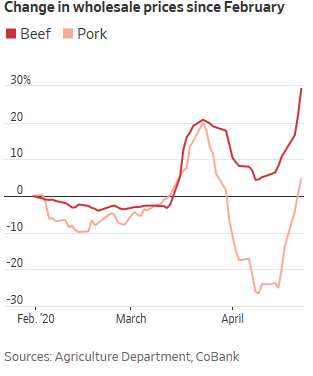The Daily Escape:

Wildflowers, Hidden Lake, Glacier NP, WY – August 2019 iPhone photo by anadoptabledog
Wrongo shopped at both Costco and at our local chain supermarket, Big Y in the past two days. Both were out of significant items, and not merely paper products.
A hallmark of American culture is the size of our supermarkets, and the dazzling variety of products available. Anyone who has shopped in foreign countries can attest to the difference, so it’s unsettling to see so many bare shelves.
What exactly is going on here? This is a downstream impact of COVID-19 and how we’re fighting the pandemic. We have a finely tuned supply chain, and the shutdown has upended it. On the demand side, commercial buyers of food, like restaurant chains, and commercial bakeries aren’t buying what they bought in pre-COVID times. While consumers are cooking at home, and buying much more than ever before.
On the supply side, there are clear disruptions: Consumer demand for meat has skyrocketed. The WSJ reports:
“US grocers are struggling to secure meat, looking for new suppliers and selling different cuts, as the coronavirus pandemic cuts into domestic production and raises fears of shortages.”
The Journal quotes Jeff Lyons, SVP at Costco:
“I have not seen beef sales and all protein behave this way since the Atkins Diet days…”
US beef production fell 24% compared with a month earlier, pork fell by 20%, and poultry was down 10%, according to estimates from CoBank, an agricultural lender. And wholesale prices are creeping up:

April’s sharp decline in beef and pork prices reflected the drop in demand after the shutdown closed restaurants, while the spike is due to increasing consumer demand when production is down.
The spread of COVID-19 among US meat plant workers has hurt meat production. Companies are trucking poultry and livestock to be processed at more distant plants that remain open. On some farms, pigs are being euthanized because slaughterhouses have closed. In Iowa, Gov. Kim Reynolds dispatched 1,000 National Guard members to help deliver COVID-19 tests to Iowa meat plants so they could get back into operation.
Egg farmers are destroying eggs. Dairy farmers have been dumping thousands of gallons of milk. Some cattle ranchers are sending their herds to early slaughter because the restaurant market is dead: No one is going out for steak & eggs, or a bacon and egg breakfast in a diner. The Hill described more lost food output:
“Some $5 billion of fresh fruits and vegetables have already gone to waste, according to the Produce Marketing Association, an industry trade group.”
We know how the virus outbreaks at food plants hurt meat production, but there are other supply chain problems.
The primary issue is supply chain mismatches caused by the lockdown. In normal times, people get a significant amount of food at restaurants, while many kids eat lunch at school. Our highly specialized supply chains can’t adapt easily or quickly to the lockdown reality.
Wholesalers who focused on restaurants do not have the facilities for packaging food in a way people are used to seeing it on shelves, and grocery stores don’t have relationships with the wholesale producers. The 50-pound bags of flour that mills sell to large bakeries or restaurants are of little use to people needing a five pound bag for a family of four.
Getting food to grocery shelves is also hampered by delivery people and grocery store workers alike who are increasingly calling out sick, either with Coronavirus, or the fear of getting it.
Finally, we’re seeing increased food insecurity. Before the pandemic began, 37 million Americans were considered food insecure. Since the start of the lockdown, about 25 million people have applied for unemployment. The bigger problem now is that so many people have no cash coming in. Meanwhile, food banks are having trouble supplying enough food to people who need it. In parts of America, that problem is far more acute that food shortages, and it’s unlikely to get better soon.
Sadly, we have millions needing food, when farmers are destroying what to them, is surplus food.
But enough of bad news, you’ve had it with a week that saw us hit 50,000 COVID-19 deaths, and Trump grabbing at straws for a Coronavirus cure. Time for our Saturday Soother, a few moments when we forget about Trump, Corona and lockdowns to focus on our breathing, and something a little different.
Today, pull up a socially distant chair and listen to Maude Maggart sing an old standard from the 1930’s, “Deep Purple”. Maggart is Fiona Apple’s sister. Pretty talented family:
Those who read the Wrongologist in email can view the video here.

An older version without the introduction: https://youtu.be/xIoVTDqRSco